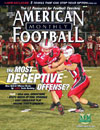AMERICAN FOOTBALL MONTHLY THE #1 RESOURCE FOR FOOTBALL COACHES
Article CategoriesAFM Magazine
|
What’s Your Motivation?by: Chip BakerAssistant Football Coach, Conroe High School (TX) © More from this issue At times it can be difficult to motivate students to do the things they are supposed to do to ensure success. As coaches we are the potter and the students are the clay. We have a challenging opportunity to mold that clay into productive, responsible, accountable students. There are number of things that we can do to help motivate our students. I will discuss some things in this article that I have seen to be beneficial. In order to motivate effectively we must make a conscious effort to build a relationship with each student. When I say build a relationship I do not mean try to be buddies or friends with them. That is not our role. I mean make an effort to find out all about them. For example: What is their background? Where do they live? What are their interests? What are their goals? What do they want to be when they....The full article can only be seen by subscribers. Subscribe today!
|
|
|||||||
| HOME |
MAGAZINE |
SUBSCRIBE | ONLINE COLUMNISTS | COACHING VIDEOS |
Copyright 2026, AmericanFootballMonthly.com
All Rights Reserved





